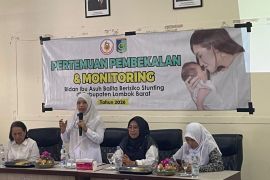Jakarta (ANTARA) - Higher education institutions are strategic partners in accelerating efforts to reduce the stunting prevalence rate, according to Budi Setiyono, secretary of the Ministry of Population and Family Development."The ministry adopts the penta-helix model, collaborating with all elements of society, including universities, which serve as our strategic partners," he stated after being sworn in at the ministry's office on Monday
He explained that higher education institutions are the government's partners in carrying out studies and taking joint action to implement programs for reducing stunting prevalence.
Baca juga: Government to regulate open dumping landfills within upcoming months
The penta-helix approach involves collaboration among academicians, media, central and regional governments, businesses, and local communities. For the stunting reduction program, Setiyono said the ministry will provide managerial support to ensure that stunting management aligns with the set targets
"The ministry has some quick-win programs, one of which is the Stunting Prevention Foster Parents Movement (Genting) across Indonesia," he added.
He informed that to support the quick-win programs, the ministry's secretariat has prepared a framework or governance system, including guidelines for the management of duties.
Baca juga: Ministry plans to build 100 training centers for migrant workers
"That way, we can convey about the programs and achievements in every region, province, district, and city," he said.
The Population and Family Development Ministry has outlined five quick-win programs for 2025, including the Stunting Prevention Foster Parents Movement (Genting), high-quality daycare services, and the Exemplary Father Movement.
Another initiative involves developing a super-app powered by artificial intelligence (AI) for family consultations. The fifth program, Empowered Elderly, will mobilize communities to care for elderly individuals without family support.
Pewarta : Lintang P, Kenzu
Editor:
I Komang Suparta
COPYRIGHT © ANTARA 2026









